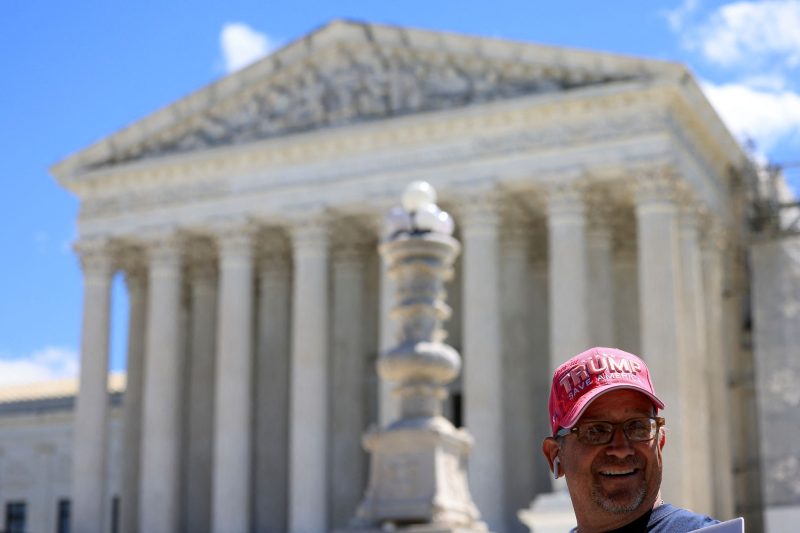Last month, YouGov conducted a poll for CBS News that included a question focused specifically on the Supreme Court case for which a decision came down Monday. Should American presidents, the pollsters asked, be granted broad immunity from criminal prosecution for actions they took in service of their presidencies?
Most Americans — more than two-thirds, in fact — said no. There were differences by political affiliation, with Democrats overwhelmingly rejecting the idea that a president should have such power. Among Republicans, a majority disagreed with offering that sort of protection, but only a relatively narrow one.
That’s not entirely surprising, given the genesis for the question. Donald Trump, indicted on state and federal charges for attempting to overturn the results of the 2020 presidential election, had argued that he (and every president) had a tacit protection from prosecution for engaging in those actions. Republicans were more likely than Democrats to support this sort of immunity, we can assume, because some portion of them recognized that it was Trump that we were really talking about.
But we don’t need to guess here. YouGov asked half of respondents specifically whether Trump should have that sort of immunity. Again, most respondents said he shouldn’t. This time, though, most Republicans — about two-thirds — said he should.
On Monday, that Republican minority got its wish — largely because of the systematic advantages Republicans have enjoyed in the Senate and thanks to the electoral college.
There are nine members of the court. The longest-serving member is Justice Clarence Thomas, nominated by George H.W. Bush and confirmed in 1991. The newest member is Justice Ketanji Brown Jackson, nominated by President Biden and confirmed in 2022.
But there’s a difference between the confirmations of those two justices. Thomas’s deeply controversial nomination earned him 52 Senate votes. Jackson’s far-less-controversial nomination landed in the modern era, when bipartisan approval of Supreme Court nominations has been abandoned. She got 53 votes.
Because of the way that power is allocated in the Senate, though, Jackson got support from senators representing far more of the country than Thomas did. Rural, lightly populated states get the same two senators that more-urban, densely populated ones do, meaning that — to use the standard example — California’s 39 million residents get the same number of senators as Wyoming’s 580,000.
If we allocate half of their state’s population to each senator, Thomas got the support of senators representing just under half the population. Jackson got the support of senators representing 57 percent of the population.
Using that same calculus, three other sitting justices also got support from senators representing less than half of the country: Justices Neil M. Gorsuch, Brett M. Kavanaugh and Amy Coney Barrett, all of whom were appointed by Trump.
Trump, of course, won the presidency thanks to another power structure that has often benefited Republicans: the electoral college. He lost the popular vote in 2016 but became president anyway, earning the right to fill a vacancy on the court immediately and then two more over the course of his presidency.
That he had the right to fill that vacancy immediately, of course, is itself a function of the imbalance of power in the Senate. Then-Senate Majority Leader Mitch McConnell (R-Ky.) rejected President Barack Obama’s 2016 nominee, Merrick Garland, something he was able to do given the Republican majority in the chamber. That majority represented about 47 percent of the country’s population. (When another court vacancy emerged in 2020, McConnell used his party’s majority to fill it immediately.)
Two other justices, Chief Justice John G. Roberts Jr. and Justice Samuel Alito, benefited from these advantages in another way. Alito was confirmed by senators representing barely more than half the country’s population, despite receiving 58 votes in the Senate. But he, like Roberts, was nominated by George W. Bush, who had been first elected in 2000 thanks to the electoral college. He was reelected in 2004 with a popular vote majority — the first Republican to do so since his father’s election in 1988. But had the popular vote determined the winner in 2000, it’s not clear any Republican would have been elected four years later.
As defenders of Trump and the Supreme Court will immediately note: This is how the system works. And that is true. It is. Five members of the nine-person Supreme Court can be nominated by presidents who lost the popular vote when they first ran, and four of them can be confirmed by senators representing less than half the country. Then they can decide, against the views of two-thirds of the country, that a president who lost the popular vote should have immunity from criminal charges for having attempted to subvert the results after he lost the popular vote again.
It’s how the system works.

